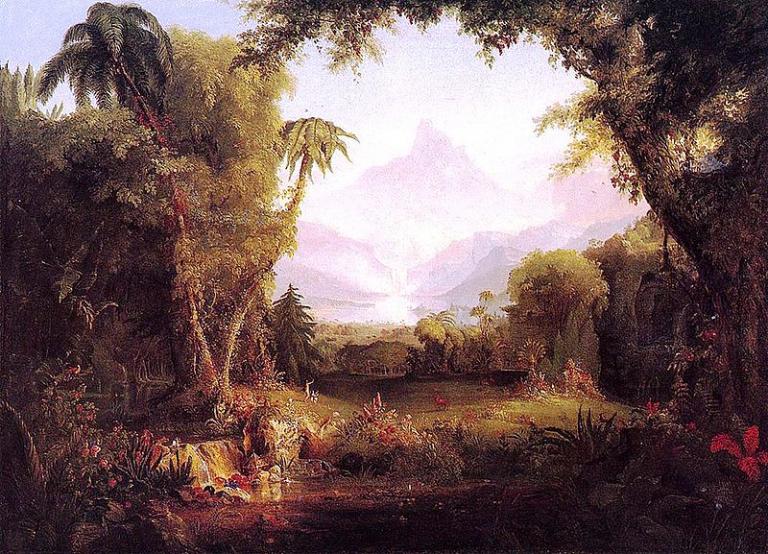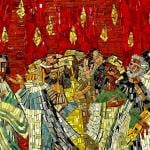
Biblical scholar Nancy Erickson reflects on her colleague John Walton’s discussion of functions and functionaries in Genesis 1. Days 1-3 of the creation story deal with functions in Walton’s account (Days 1-3 are about time, weather and food respectively). Days 4-6 deal with functionaries. Humanity’s function is to operate in a “ godlike capacity in relationship to the rest of creation.” Here’s Erickson:
Following the normal literary structure of Genesis 1, Walton now explains days four through six as describing the installation of functionaries and their roles associated specifically with their inhabited space: celestial bodies in their sphere (day four), creatures and cosmic space (day five), and animals in terrestrial space (day six). The end of the chapter is devoted to the functions assigned humanity, rightly highlighting humankind as the climax of the creation account and whose functions, among procreating and subduing or ruling other creatures, includes functioning primarily in a godlike capacity in relationship to the rest of creation (i.e. in God’s image).
The question arises at this point: how godlike are we functioning as humans here on earth?
Before we seek to address this question, it would be good to present days 4-6, which for Walton depicts celestial bodies, sea creatures, animals, and humans functioning in their respective domains of space:
And God said, “Let there be lights in the expanse of the heavens to separate the day from the night. And let them be for signs and for seasons, and for days and years, and let them be lights in the expanse of the heavens to give light upon the earth.” And it was so. And God made the two great lights—the greater light to rule the day and the lesser light to rule the night—and the stars. And God set them in the expanse of the heavens to give light on the earth, to rule over the day and over the night, and to separate the light from the darkness. And God saw that it was good. And there was evening and there was morning, the fourth day.
And God said, “Let the waters swarm with swarms of living creatures, and let birds fly above the earth across the expanse of the heavens.” So God created the great sea creatures and every living creature that moves, with which the waters swarm, according to their kinds, and every winged bird according to its kind. And God saw that it was good. And God blessed them, saying, “Be fruitful and multiply and fill the waters in the seas, and let birds multiply on the earth.” And there was evening and there was morning, the fifth day.
And God said, “Let the earth bring forth living creatures according to their kinds—livestock and creeping things and beasts of the earth according to their kinds.” And it was so. And God made the beasts of the earth according to their kinds and the livestock according to their kinds, and everything that creeps on the ground according to its kind. And God saw that it was good.
Then God said, “Let us make man in our image, after our likeness. And let them have dominion over the fish of the sea and over the birds of the heavens and over the livestock and over all the earth and over every creeping thing that creeps on the earth.”
So God created man in his own image,
in the image of God he created him;
male and female he created them.And God blessed them. And God said to them, “Be fruitful and multiply and fill the earth and subdue it, and have dominion over the fish of the sea and over the birds of the heavens and over every living thing that moves on the earth.” And God said, “Behold, I have given you every plant yielding seed that is on the face of all the earth, and every tree with seed in its fruit. You shall have them for food. And to every beast of the earth and to every bird of the heavens and to everything that creeps on the earth, everything that has the breath of life, I have given every green plant for food.” And it was so. And God saw everything that he had made, and behold, it was very good. And there was evening and there was morning, the sixth day. (Genesis 1:14-31; ESV).
We do not have opportunity to exegete this entire passage. For our purposes, I will focus attention on our particular functioning as humans. In my estimation, central to humanity’s godlike functions involving being created in God’s image is conscious reflection on the universe around us. While there is more to our relational constitution concerning our connection to God, to one another, and to the non-human creation, conscious reflection is certainly part of what makes us human. Such consideration of human uniqueness is not limited to the realm of biblical meditation. According to Br. Guy Consolmagno of The Vatican Observatory, one of the characteristic traits that makes us human is “the ability to look at the sky with wonder.” Dr. Jeff Hardin at The University of Wisconsin says that whenever he looks through a microscope, he “cannot help but be struck with a sense of awe and wonder.” Whether looking through a telescope or a microscope, a sense of “awe and wonder” pervades the human and scientific quest for understanding. As Dr. Jennifer Wiseman of AAAS and NASA claims, it is our task as human societies, faith communities and philosophers to “dig deep” and discover what the message is that is “beyond just what science is telling us” (Refer here to AAAS/DoSER’s excellent video “Awe and Wonder” for these reflections on the scientific quest).
Humane reflection is godlike reflection—thinking God’s thoughts after God. It does not involve that form of mundane mastery with our minds and then with our hands that simply aims to control the environment and use it merely to make a profit or to engage in mere sport. Rather, the sense of awe and wonder that makes us truly human involves a sacred regard for all life. Otherwise, we ourselves lose that dimension of existence that makes us distinctive. That is what happens when we try to play God rather than be like God.
Those who explore the universe with a sense of awe and wonder not only grasp the grandeur of the universe, but also guard against grasping to exploit it. They realize that no matter how powerful and majestic nature is, life is very precious, and its harmonious balance on which we depend for our own existence is so intricate and even fragile. So, may we look to the stars and skies, the seas and the dry land where abundant life teems, with a sense of awe and wonder rather than arrogant disregard. May we never take life in all its fecundity and mystery for granted. Otherwise, those who come after us may not be able to experience the goodness and beauty of our world, but rather face the very real threat of its destruction and our extinction as a race.
In closing, it is worth noting that while astrophysicists and astrobiologists go in search of life beyond earth, a new study claims that it might be much harder to find advanced life than many scientists imagine. An AAAS article titled “New study dramatically narrows the search for advanced life in the universe” includes a tagline that reads “Toxic gases limit the types of life we could find on habitable worlds.” According to the study’s lead researcher, Edward Schwieterman, “… showing how rare and special our planet is only enhances the case for protecting it.” He continues, “As far as we know, Earth is the only planet in the universe that can sustain human life.” May we humans also be rare and special, even godlike, by protecting the masterpiece of creation. Only as we contemplate and cherish the world and universe in all its vibrant glory do we function well as humans created in God’s image.












